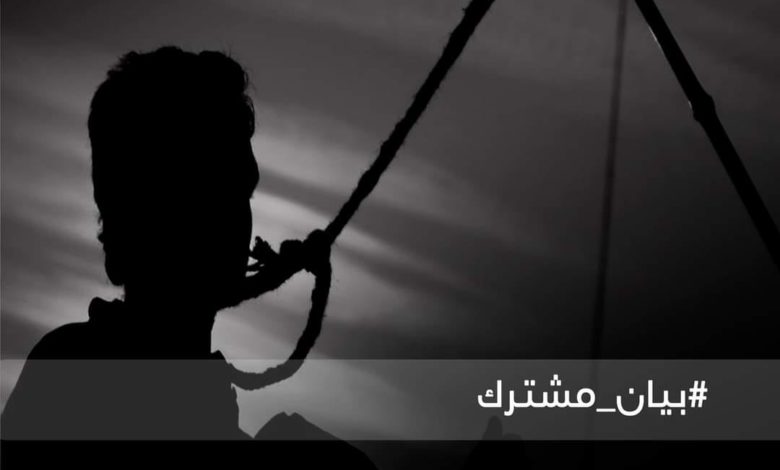
القاهرة- 30 ابريل 2021
تعرب حملة أوقفوا عقوبة الإعدام في مصر والمنظمات الحقوقية الموقعة أدناه عن استنكارها الشديد ورفضها القاطع للتوسع من قبل الحكومة المصرية في تنفيذ عقوبة الإعدام، حيث وردت معلومات جديدة تفيد بأن مصلحة السجون في سجن وادي النطرون قامت أول أمس، 28 ابريل 2021، بتنفيذ عقوبة الإعدام على سبعة محكومين في القضية المعروفة إعلاميًا بقضية اقتحام قسم شرطة كرداسة، بعد يومين فقط من تنفيذ عقوبة الإعدام على تسعة محكومين آخرين في نفس القضية. وفي ظل تعتيم اعلامي على هذه الاعدامات الأخيرة، لم يتسنى بعد التأكد من العدد المؤكد وكل أسماء من تم تنفيذ حكم الإعدام بحقهم إلا فيما يخص اثنين تسلم ذويهم جثمانهما وهما محمد عامر يوسف الصعيدي وقطب السيد قطب، فيما وردت أنباء عن إخطار خمس أسر بأنه تم تنفيذ عقوبة الإعدام بحق ذويهم الخمسة ولم يتسلموا جثمانيهم بعد. إن هذا التسارع في وتيرة تنفيذ الإعدامات الجماعية أمر غير مسبوق، ناهيك عن كونه يخالف العرف المستقر بعدم تنفيذ الإعدام في شهر رمضان. إن استمرار الحكومة المصرية على هذا الحال ينذر بأن مصر سوف تكون منافساً قوياً على الترتيب الأول عالميا في تطبيق عقوبة الإعدام في 2021، وهو أمر أشد خزياً بعدما جاءت مصر في الترتيب الثالث عالميا في 2020 بعد الصين وإيران، حسب التقرير السنوي الأخير لمنظمة العفو الدولية.
ونفذت الحكومة المصرية أحكام بالإعدام على مدار الأيام الثلاثة السابقة بدون إعلام مسبق لذوي المدانين بميعاد التنفيذ وعدم السماح لهم بمقابلتهم قبل التنفيذ طبقاً للمادة 472 من قانون الإجراءات الجنائية والتي تنص على أن أقارب المحكوم عليه بالإعدام لهم الحق في أن يقابلوا المحكوم في اليوم الذي يعين لتنفيذ الحكم، على أن يكون ذلك بعيداً عن محل التنفيذ، وإجراء التسهيلات اللازمة لتمكين أحد رجال الدين من مقابلته لإتمام أي فروض دينية قبل الموت، كما ينص القانون المصري على حضور المحامين والتي نصت عليه الفقرة الأولى من المادة. كما نصت المادة 474 من القانون على إلزامية إعطاء الأذن للمدافع عن المحكوم بحضور التنفيذ.
إلا أن قانون العقوبات المصري لا يرتب ثمة جزاء أو عقوبة على مخالفة النصوص القانونية الخاصة بتنفيذ عقوبة الإعدام وهو الفراغ التشريعي الذي يساعد جهات التنفيذ على عدم الامتثال للقواعد القانونية ولمبدأ سيادة القانون الذي أكد عليه الدستور المصري. فعدم إخبار أهلية المحكوم عليهم بموعد تنفيذ حكم الإعدام أمر ينال من كرامية وآدمية المنفذ عليهم تلك العقوبة ومن جهة أخرى يحدث أضراراً نفسية جسيمة بحق عائلات المنفذ عليهم أحكام الإعدام ولاسيما أن التنفيذ في المناسبات الدينية الخاصة بديانة المنفذ عليهم يخالف العرف بوزارة الداخلية على عدم تنفيذ أحكام الإعدام خلال شهر رمضان.
وعلى الصعيد الرسمي لم تصدر حتى الآن أية جهة حكومية أو قطاع تابع لوزارة الداخلية أو النيابة العامة بياناً رسمياً توضح فيه أسماء المنفذ عليهم حكم الإعدام في قضية اقتحام قسم شرطة كرداسة وماهية الإجراءات المتبعة في التنفيذ من قبل مصلحة السجون في حضور النيابة العامة وفقاً لنصوص قانون الإجراءات الجنائية. إن الغموض وعدم نشر البيانات الخاصة بالقضايا المنفذ بها عقوبة الإعدام بشكل شفاف هو نهج تسلكه واعتادت عليه الجهات الحكومية المصرية وتحديداً في ملف الإعدامات المنفذة والتي تقوم بها وزارة الداخلية تحت رقابة النيابة العامة. ويعد مسلك الجهات الرسمية في هذا الشأن مخالفاً للحق في إتاحة المعلومات وتداولها والحق في المعرفة وهو ما ينال من شفافية منظومة العدالة الجنائية في مصر في ملف الإعدامات. عدم إتاحة المعلومات والبيانات من قبل الجهات الرسمية هو أمر يخالف ما نصت عليه المادة رقم 68 من الدستور المصري والتي تكفل لكافة المواطنين الحق في الحصول على المعلومات والبيانات والوثائق الرسمية وأنه التزام يقع على عاتق الدولة بأن تفصح عن تلك البيانات وتوفرها وتتيحها للكافة بشفافية بوصفها ملكاً للشعب. كما أقرت المادة 19 من العهد الدولي للحقوق المدنية والسياسية الحق في حرية تداول المعلومات.
في خلال الأعوام الماضية دعت الكثير من الدول والهيئات الدولية والمؤسسات الحقوقية إلى وقف تنفيذ العمل بعقوبة الإعدام كرادع جنائي واستبداله بعقوبات مثل السجن مدى الحياة أو العمل من أجل الخدمة العامة وغيرها من البدائل وهو الأمر الذي أكدت عليه الجمعية العامة للأمم المتحدة بقرارها السنوي المعتمد والصادر في يناير من عام 2018 والذي دعا إلى وقف العمل بعقوبة الإعدام في جميع أنحاء العالم، وقد حظي هذا القرار بدعم 121 دولة.
تدعو حملة أوقفوا عقوبة الإعدام في مصر والمنظمات الموقعة أدناه الحكومة المصرية إلى تأجيل تنفيذ أحكام الإعدام بشكل مؤقت لحين إجراء نقاش مجتمعي واسع حول العقوبة، ودراسات منهجية حول قدرتها على الردع ومنع تكرار الجرائم، والنظر في تقليل عدد الجرائم التي يُعاقب عليها بالإعدام. كما تدعوها إلى الالتزام بقانون الإجراءات الجنائية المصري بإبلاغ أهالي المحكوم عليهم بالإعدام بميعاد التنفيذ والسماح لهم بزيارة المحكوم عليه وفقاً لما هو منصوص عليه في القانون المصري والمعايير الدولية لحقوق الإنسان. كما على الحكومة المصرية الالتزام بمعايير الشفافية وإتاحة المعلومات حول تنفيذ عقوبة الإعدام نظراً لما ينتج عن التعتيم من قبل وزارة الداخلية وعدم إعلان أسماء المنفذ عليهم العقوبة من تعذيب للأهالي لعدم تأكدهم من صحة المعلومات المنشورة إعلامياً. كما يجب على الحكومة المصرية مراعاة الحالة الروحية التي يمر بها المحكوم عليهم بالإعدام وذويهم أثناء المناسبات الدينية المختلفة. وتجدد مناشدتها السلطات المصرية وقف تنفيذ عقوبة الإعدام في مصر.
الموقعون:
حملة أوقفوا عقوبة الإعدام في مصر
المفوضية المصرية للحقوق والحريات
مركز النديم
المبادرة المصرية للحقوق الشخصية
كوميتي فور جستس
مبادرة حرية
مركز بلادي للحقوق والحريات
Will Egypt compete for the world’s worst executioner in 2021?
The Campaign to Stop the Death Penalty in Egypt and the undersigned human rights organizations strongly condemn and categorically reject the Egyptian government’s exapnsion of the implementation of the death penalty, with new reports indicating that the Prisons Authority in Wadi Al-Natrun Prison on April 28 executed seven convicts in the case known as “the storming of Kerdasa police station”. The executions took place just two days after the death penalty was carried out on nine other convicts in connection with the same case.
Due to a media blackout on these recent executions, it has not yet been possible to verify the confirmed number and all the names of those who have been executed, except with regard to two people, Muhammad Amer Yousef Al-Saidi and Qutb Al-Sayyid Qutb, whose relatives received their bodies. Meanwhile, five families have reportedly been notified that their five relatives had been executed, without releasing their bodies.
This acceleration in the pace of mass executions is unprecedented, not to mention that it contravenes the established practice of not carrying out executions during the month of Ramadan. The continuation of such behaviour by the Egyptian government heralds that Egypt is set to be a strong competitor for the first rank in the world in the application of the death penalty in 2021. This would be more shameful than Egypt’s ranking third in the world in 2020 after China and Iran, according to the latest Amnesty International annual report.
The Egyptian government carried out death sentences over the previous three days without prior notification to the families of the convicts of the execution date. The families have also not been allowed to see their relatives before the execution, a right enshrined by Article 472 of the Criminal Procedure Law, which stipulates that relatives of the person sentenced to death have the right to meet the convict on the day of the execution of the sentence in a place should be far from the place of implementation. The law also stipulates that necessary facilities shall be made to enable a cleric to meet the death row inmate to complete any religious duties before death. Egyptian law also provides for the presence of lawyers, which is stipulated in the first paragraph of the aforementioned article. Furthermore, Article 474 of the same law stipulates the compulsory granting of permission to the lawyer of the convicted person to attend the execution.
However, the Egyptian Penal Code does not stipulate a penalty or punishment for violating the legal provisions regarding the implementation of the death penalty. Such a loophole helps the enforcement agencies not to comply with the legal rules and the principle of the rule of law affirmed by the Egyptian constitution. Failure to inform the convicts’ families of the date of the execution of the death sentence dehumanizes the victims of that punishment. On the other hand, it causes severe psychological damage to the families of those who are executed, especially since the implementation of such a penalty during the month of Ramadan contradicts the custom of the Ministry of Interior not to carry out death sentences during religious events related to the religion of the inmates.
On the official level, no government agency or sector affiliated with the Ministry of Interior or the Public Prosecution has yet issued an official statement clarifying the names of those executed in connection with the case of storming the Kerdasa Police Station, and what procedures, if any, have been followed by the Prisons Authority in the presence of the Public Prosecution in accordance with the provisions of the Criminal Procedure Law.
Ambiguity and the failure to publish data on cases in which the death penalty is carried out in a transparent manner is an approach that Egyptian government agencies are adopting and become accustomed to, specifically with regard to executions carried out by the Ministry of Interior under the supervision of the Public Prosecution.
The conduct of official authorities in this regard violates the right to disclose and circulate information and the right to know, which undermines the transparency of the criminal justice system in Egypt in relation to its handling of the death penalty. The failure to make information and data available by official authorities is contrary to what is stipulated in Article 68 of the Egyptian Constitution, which guarantees all citizens the right to obtain information, data and official documents, and states that it is an obligation for the state to disclose and provide such data and make it available to all in a transparent manner as it is the property of the people. Article 19 of the International Covenant on Civil and Political Rights also recognized the right to freedom of information.
Over recent years, many countries, international bodies and human rights institutions have been calling for a moratorium on the implementation of the death penalty as a criminal deterrent, and to replace it with penalties such as life imprisonment or work for public service and other alternatives. That was confirmed by the United Nations General Assembly, in its annual resolution adopted and issued in January 2018, which called for a moratorium on the death penalty worldwide. This decision had the support of 121 countries.
The Stop the Death Penalty Campaign in Egypt and the undersigned organizations call on the Egyptian government to temporarily postpone the execution of death sentences until a broad societal discussion about the punishment is held, and until it carries out systematic studies on the death panelty’s feasibility in deterring and preventing the recurrence of crimes, and to consider reducing the number of crimes punishable by death.
We also call on the Egyptian government to abide by the Criminal Procedure Law by informing the families of those sentenced to death of the execution date and allowing them to visit the convict in accordance with what is stipulated in Egyptian law and international human rights standards. The Egyptian government must also adhere to standards of transparency and provide information on the implementation of the death penalty, given the devastating impact of the blackout by the Ministry of Interior on the families of victims who have no other means of verifying the information published in the media. The Egyptian government must also take into account the spiritual conditions experienced by those sentenced to death and their families during various religious occasions. We also reiterate our appeal to the Egyptian authorities to stop carrying out the death penalty in Egypt.
Signatories:
Stop the Death Penalty campaign
Egyptian Commission for Rights and Freedoms (ECRF)
El Nadeem Center for Rehabilitation of Violence and Torture Victims
Egyptian Initiative for Personal Rights (EIPR)
Committee for Justice (CFJ)
The Freedom Initiative
Belady Center for Rights and Freedoms





